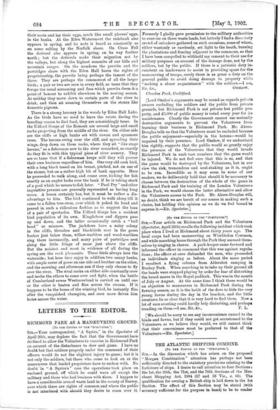LETTERS TO THE EDITOR.
RICHMOND PARK AS A MANCEUVRING GROUND.
(To THE EDITOR OF THE "SPECTATOR.")
Sin,—Your correspondent, "A Squire," ill the Spectator of April 26th, may deplore the fact that the Government have declined to allow the Volunteers to exercise in Richmond Park on account of the disturbance to deer and game. I have no doubt but that soldiers properly under the command of their officers would do not the slightest injury to game; but it is not only the soldiers, but those who come to look on at the manoeuvres that landed proprietors have to reckon with. No doubt in "A Squire's" case the operations took place on enclosed ground, off which he could warn all except the military and those who had business with them. I happen to have a considerable area of waste land in the county of Surrey, over which there are rights of common and where the public is not interfered with should they desire to roam over it. Formerly I gladly gave permission to the military authorities to exercise on these waste lands, but latterly I find a disorderly crowd of onlookers gathered on such occasions, some of whom, either wantonly or carelessly, set light to the heath, burning the plantations and fencing adjacent to the commons, so that I have been compelled to withhold my consent to their use for military purposes on account of the damage done, not by the soldiers, but by the public. If there is a patriotic duty in- cumbent on landowners to assist in providing space for the manoeuvring of troops, surely there is as great a duty on the general public to avoid doing damage to property wliila "making a closer acquaintance" with the soldiers.—I am, [Lord Onslow's arguments may be sound as regards private owners excluding the soldiers and the public from private grounds, but Richmond Park is not private but public pro- perty, and 25,000 of public money is voted every year for its maintenance. Clearly the Government cannot use mutually destructive arguments to prevent the Volunteers from [earning- their business in Richmond Park. Mr. Akers- Douglas tells us that the Volunteers must be excluded because the public enjoyment—especially in the herons—would be impaired by their presence. Lord Onslow, if we understand him rightly, suggests that the public would so greatly enjoy the presence of the Volunteers that they would invade Richmond Park in such vast numbers that the game would be injured. We do not feel sure that this is so, and that the game would be destroyed by the Volunteers, but in our view the risk, tremendous and soul-shaking as it is, ought to be run. Incredible as it may seem to some of our readers, we do deliberately hold that should it be necessary to choose between the destruction of the whole of the game in Richmond Park and the training of the London Volunteers in the Park, we would choose the latter alternative and allow the Volunteers access to the Park. Mr. Akers-Douglas will, no doubt, think we are bereft of our senses in making such a choice, but holding this opinion as we do we feel bound to express it.—En. Spectator.]










































 Previous page
Previous page